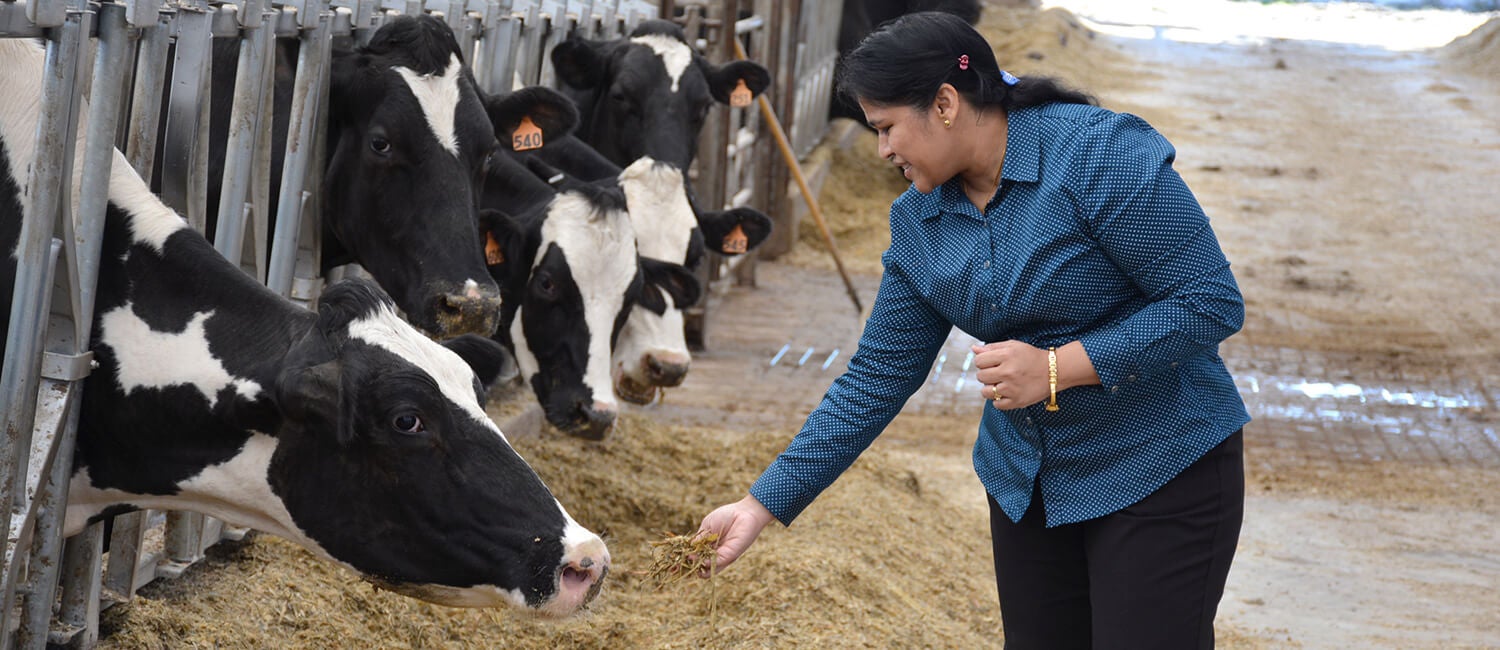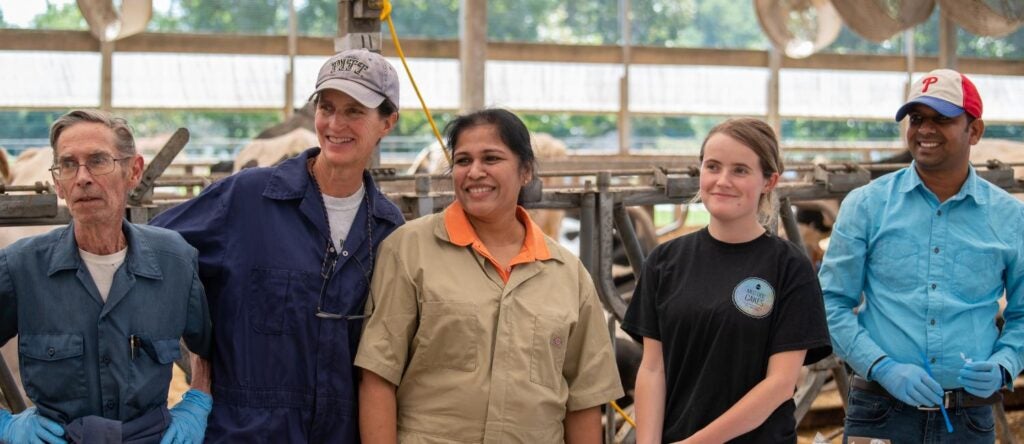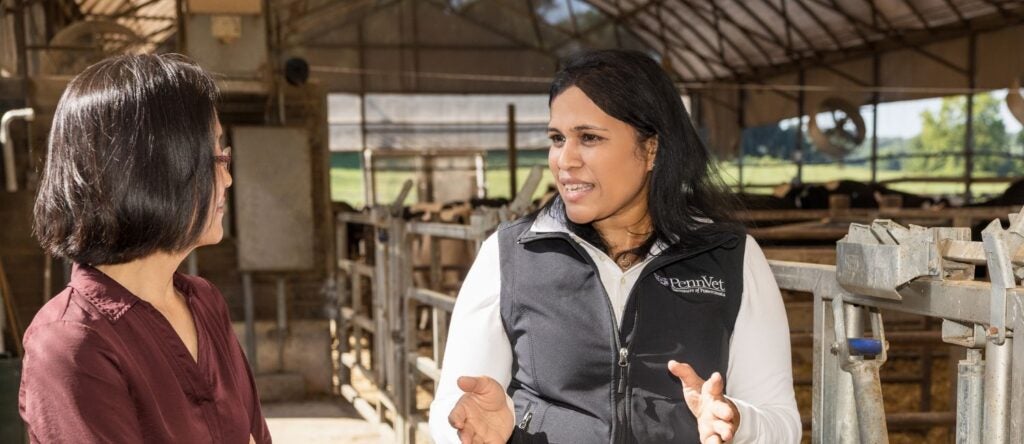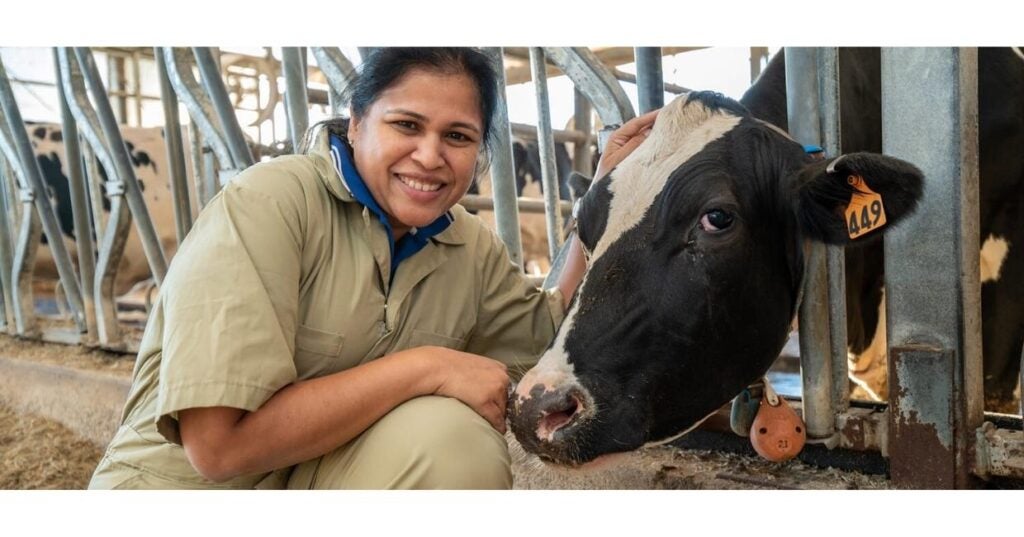University of Pennsylvania’s School of Veterinary Medicine Awarded Nearly $1 Million to Increase Efficiency of Dairy Herds and Reduce Methane Emissions

Associate Professor of Ruminant Nutrition Dipti Pitta at the University of Pennsylvania’s School of Veterinary Medicine (Penn Vet) has received a $995,000 grant from the U.S. Department of Agriculture’s National Institute of Food and Agriculture to lead an interdisciplinary team of animal and data scientists to establish a precision data network, with the long-term goal of identifying high-productivity dairy cows with low methane emissions, to enhance dairy herd sustainability and moderate environmental impacts.
“This funding gives us a tremendous opportunity to further evaluate microbial associations in the rumen that are essential for methane mitigation,” said Pitta who is leading the project. “Our team of researchers will be evaluating the behavioral activities, milk production and feed-consumption profiles, as well as sequencing of the microbiomes and host genomes across multiple dairy herds to identify potential predictors of methane production. This comprehensive integration of very dense data sets will not only identify phenotypic responses that could reduce methane output; it could positively impact the economic health of farms, and the agriculture sector. It’s a win-win.”
The study’s co-investigators are the University of Pennsylvania’s Darko Stefanovski, PhD, Linda Baker, VMD, and Joseph Bender, DVM; Cedar-Sinai’s Ryan Urbanowicz, PhD; North Carolina State University’s Stephanie Ward, PhD; and Pennsylvania State University’s Kevin Harvatine, PhD, and Rob Goodling, MS.
The grant is awarded through the National Institute of Food and Agriculture’s Inter-Disciplinary Engagement in Animal Systems (IDEAS) Agriculture and Food Research Initiative (AFRI). The IDEAS AFRI program funds applied science approaches, integrating knowledge from diverse disciplines, that address challenges facing the United States’ food and agriculture sector.
Related News

Understanding how a red seaweed reduces methane emissions from cows (link is external)
Methane emissions from livestock are a leading contributor to climate warming. In a collaborative study testing the diets of cows, Dipti Pitta (pictured) and Nagaraju Indugu of the School of…

Penn Vet Scientist Receives More Than Half a Million Dollars For Research and Development of Mitigation Technology to Halt Methane Emissions from Dairy Cattle
Funding from Gerstner Philanthropies will study effects of probiotic supplement to prevent methane production in commercial herds.

Could we breed cows that emit less methane? (link is external)
In a new study, researchers from the School of Veterinary Medicine identified attributes of low-methane-emitting dairy cows that could be used as targets for selective breeding.
About Penn Vet
Ranked among the top ten veterinary schools worldwide, the University of Pennsylvania School of Veterinary Medicine (Penn Vet) is a global leader in veterinary education, research, and clinical care. Founded in 1884, Penn Vet is the first veterinary school developed in association with a medical school. The school is a proud member of the One Health initiative, linking human, animal, and environmental health.
Penn Vet serves a diverse population of animals at its two campuses, which include extensive diagnostic and research laboratories. Ryan Hospital in Philadelphia provides care for dogs, cats, and other domestic/companion animals, handling more than 30,000 patient visits a year. New Bolton Center, Penn Vet’s large-animal hospital on nearly 700 acres in rural Kennett Square, PA, cares for horses and livestock/farm animals. The hospital handles more than 6,300 patient visits a year, while our Field Services have gone out on more than 5,500 farm service calls, treating some 22,400 patients at local farms. In addition, New Bolton Center’s campus includes a swine center, working dairy, and poultry unit that provide valuable research for the agriculture industry.

